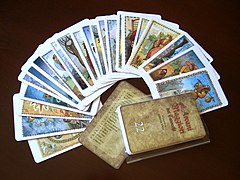A JRPG’s Lore is Better Than Your Favorites’
How on Earth Did Eight Teens and a Cat Defeat the Government

April 12, 2022
Imagine you are one of the most powerful people ever, until one day, eight teenagers and a talking cat just walked in and bested you. Persona 5 (P5) is a Japanese role-playing game that is centered around rebellion. From the way P5 sheds a positive light on social media, showing teenagers being able to confront abusive teachers and corrupt adults, to simply its worldbuilding, is astounding. I will make this summary of the game short since it would take too long if I did not. The JRPG has a theme of corrupted adults. This includes people like abusive teachers, corrupt police, anything of that sort. Teenagers find a way to transport themselves into the adults’ hearts, and “steal them,” leading to a change of heart where the target confesses their crime, making the world a little better. Just to elaborate, for the Phantom Thieves to steal someone’s heart, they send out a calling card. You know, the basic cut-out magazine text on cardstock calling the target out publicly. The game’s worldbuilding is just as fascinating as the face value story, dealing with arcana and Personas. While I would love to go into detail on those, I will make the descriptions short, so you at least have some background.
Arcana is in reference to the major and minor groups of cards in a tarot deck. All characters, the heroes, their Personas, and your confidants, are assigned an Arcana. They all make sense; you would be able to guess why. Like Ryuji, your hotheaded homie who likes punching things is assigned to the Chariot Arcana. Personas are a manifestation of their user’s personality and sprout from a strong sense of justice. Shadows are the exact opposite. They are the target’s corrupted desires manifested and are what the target thinks of themselves unconsciously. With Personas, come our heroes’ costumes as well. Whatever rebellion means to them is how their Persona and their attire are presented. This could mean outlaws, femme fatales, hackers, and more. (The costume symbolism is so cool! Read the article hyperlinked if you have the time!) Again, these Personas all have an arcana. This is one of the most interesting topics, but I will save you the headache, and just talk about the most interesting part of any game, the characters.
The characters in the game focus on nine teenagers collectively called the Phantom Thieves. Well, technically eight teenagers and one cat. Our protagonist is Ren, associated with the fool arcana, the card labeled zero. The fool card is the card of unlimited possibilities and can be placed anywhere in the deck. This is because the major arcana is seen as the fool’s life, so it does not matter where you place him, he is ubiquitous. His Persona, Arsène, is based on the gentleman thief Arsène Lupin, created by Maurice Leblanc. There are many parallels between Arsène and Ren; the obvious one being that Arsène Lupin is a criminal that targets criminals worse than him, which is exactly what the PTs do. The most interesting one though is that once Arsène allowed himself to get arrested once because he protected a woman, which is the exact reason Ren was arrested.
But, Ren is not even the most interesting Phantom Thief; I would say Futaba is. Futaba had become a shut-in who only communicated via the internet after her mother died and her suicide note was fabricated. Her mother’s death led to Futaba developing clinical depression, and severe anxiety, and would often talk to voices and people who were not actually there. Her desire for her mother to be alive and her guilt from her death had led to her developing a Palace; Palaces usually indicate desires and greed, but Futaba’s shadow was not like the others. Futaba had sent the Phantom Thieves a request to change her heart. Her self-loathing made her shadow develop a helpful personality, only desiring Futaba’s happiness. Her shadow even guided the PTs to her heart. Her Palace was a pyramid, making her shadow a pharaoh. The pyramids are seen as the pharaoh’s tomb. This was because of her belief that her home would be her tomb. After her heart was changed, she gained the Persona Necronomicon. Necronomicon is a magic grimoire, with the risk of making someone go mad. Futaba is the PT’s informant, and a hacker in real life, so it makes perfect sense.
Learning little facts like Arsène Lupin’s story, the femme fatale Personas, the Arcana and how all their pieces fit perfectly into the story is super cool and inspiring! I would gladly be called a criminal if I were targeting people worse than I am. Or maybe my pick would be a femme fatale? I mean, who would not love being able to beguile men to do anything they wanted? Alongside finding inspiring role models like normal teenagers and fictional characters, simply relating to the characters in this game and their stories are super cool. I personally relate a lot to Futaba. She is the hermit arcana, representing having to continue to move forward to see where to go next. Seeing someone like me be able to leave her safe place and become braver and more comfortable with others and the world was awesome. Even if I cannot steal someone’s heart, it is okay to ask someone to steal mine.
Well, even if you cannot steal someone’s heart or take down the most powerful man in Japan in a day, why not send a calling card? Even the smallest voices from us teenagers can allow us to achieve anything.










